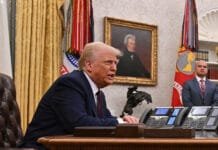Trump’s Controversial Pardon for Capitol Hill Rioters: What It Means for America
In a stunning revelation that has captivated the political world, newly elected President Donald Trump has announced his plans to pardon individuals involved in the January 6 Capitol Hill riots. This decision, which is set to unfold on his first day in office, has sparked a wave of controversy and debate across the United States and the international community. As we approach the fourth anniversary of the violent events that unfolded at the U.S. Capitol, Trump’s statement is likely to have far-reaching implications for American politics, law enforcement, and the broader public perception of the Capitol insurrection.
The Capitol Hill Riots: A Brief Overview
On January 6, 2021, the United States witnessed one of the most significant and troubling assaults on its democratic processes in modern history. Thousands of pro-Trump supporters stormed the U.S. Capitol in Washington D.C., with the intent of preventing the certification of the Electoral College results from the 2020 presidential election. This act of violence and insurrection led to widespread destruction, chaos, and tragic consequences. Several lives were lost, and many others were injured during the riots.
The storming of the Capitol, marked by vandalism, looting, and violent clashes with law enforcement, resulted in the arrest of hundreds of individuals. These rioters faced various charges, including assaulting police officers, breaking into federal property, and engaging in insurrection. For many, this event represented a stark moment in American history—one that would go down as a dark chapter in the nation’s fight for democracy.
Trump’s Promise to Pardon the Rioters
Donald Trump’s recent pledge to offer pardons to the Capitol rioters has raised a multitude of questions and reactions. In his first television interview after winning the election, Trump stated that those involved in the Capitol riots “deserve relief” and should not face the consequences of their actions. This statement, made shortly after securing the presidency, has ignited a firestorm of controversy within the political establishment and among the American public.
Trump’s argument rests on the claim that the rioters acted out of political conviction and that their actions were, in his view, a misguided attempt to defend the American way of life. In his words, these individuals were “patriots” who, according to him, were merely trying to express their frustrations over a perceived stolen election. The announcement that he would grant them pardons has been met with mixed reactions, with many arguing that such a move undermines the rule of law and the integrity of American democracy.
Legal and Constitutional Implications of a Pardon
The U.S. Constitution grants the president broad powers of clemency, including the ability to issue pardons for federal offenses. However, the use of this power is not without controversy, particularly when it involves individuals accused of crimes that directly threaten the stability of the nation’s democratic institutions. Critics of Trump’s decision argue that pardoning those responsible for the Capitol riots could set a dangerous precedent, where individuals who engage in acts of insurrection and violence are absolved of accountability.
Legal experts contend that such pardons could diminish the severity of the crimes committed during the Capitol riot and send a signal to future generations that violent actions against the government may go unpunished. This is a particularly concerning issue when considering the broader implications for public trust in the democratic process and the ability of the criminal justice system to hold individuals accountable for their actions.




















